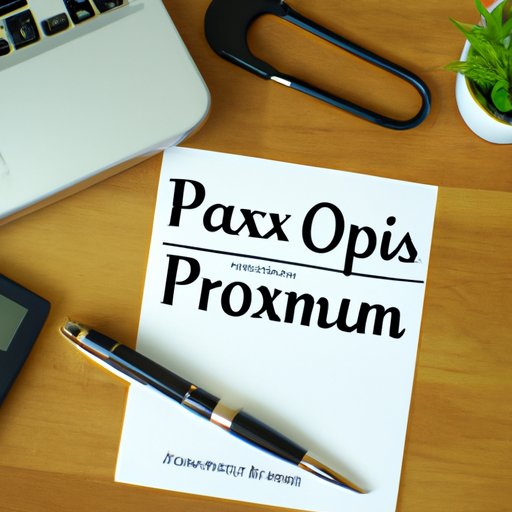
Introduction
Understanding health insurance plans can be difficult, especially when it comes to Point of Service (POS) health plans. Many people struggle to understand what a POS health plan is and how it differs from other health insurance options. In this article, we will provide a comprehensive guide to understanding a POS health plan and how it can benefit you and your healthcare needs.
Understanding the Basics of a POS Health Plan: A Comprehensive Guide
A Point of Service (POS) health plan is a type of health insurance plan that combines features of both Health Maintenance Organizations (HMOs) and Preferred Provider Organizations (PPOs). With a POS plan, you will be able to choose between in-network or out-of-network providers for your healthcare needs. In-network providers are typically cheaper than out-of-network providers, but there may be certain circumstances where you may need to see an out-of-network provider.
Compared to an HMO plan, a POS plan gives you more freedom to choose your healthcare providers. However, it is important to note that if you choose to see an out-of-network provider, you will typically pay more than you would for an in-network provider. This could mean higher premiums, deductibles, or copays.
On the other hand, compared to a PPO plan, a POS plan is typically less expensive. This is because a POS plan has a smaller network of providers than a PPO plan, which helps keep costs lower. Additionally, you will typically need a referral from your primary care physician to see a specialist with a POS plan, which can help control costs.
How a POS Health Plan Works and What It Means for Your Healthcare
A POS health plan utilizes a network of healthcare providers that have agreed to provide services to plan members at a discounted rate. When you enroll in a POS plan, you will typically select a primary care physician who will be your first point of contact for healthcare needs. Your primary care physician will be responsible for coordinating your care and providing referrals to specialists for treatment.
Once you have received a referral to see a specialist, you can choose to see an in-network or out-of-network provider. If you choose an in-network provider, you will typically pay less out of pocket than if you choose an out-of-network provider. However, if you decide to see an out-of-network provider, you will typically need to pay more out-of-pocket costs.
A POS health plan can be beneficial for those who want the freedom to choose their healthcare providers but also want the cost savings that come with staying within a network. It can also be beneficial for those who need to see a specialist as you will typically need a referral, which can help prevent unnecessary healthcare expenses.
Choosing the Right Health Insurance: The Pros and Cons of a POS Plan
Like any health insurance plan, a POS plan has its pros and cons. One of the benefits of a POS plan is that it offers a balance between cost savings and provider choice. This means that you can have the freedom to see providers outside of your network, but still, receive cost savings when you see providers within your network.
However, one of the drawbacks of a POS plan is that it can be more expensive than an HMO plan. This is because you are paying for additional flexibility with provider options. Additionally, if you need to see a specialist frequently, the cost of copays and deductibles could add up quickly, increasing your overall healthcare costs.
When choosing the right health insurance plan for you, it is important to consider your unique healthcare needs. If you value provider choice and are willing to pay for it, then a POS plan may be the best option for you. However, if you prefer lower costs and don’t mind staying within a network of providers, an HMO plan may be a better option.
Navigating the Healthcare System with a POS Health Plan
It can be challenging to navigate the healthcare system with any health insurance plan, but a POS plan can add additional complexity due to the flexibility it offers. To get the most out of a POS plan, it is important to understand how the plan works and how to use it effectively.
One of the best ways to navigate the healthcare system with a POS plan is to stay informed about your plan and its coverage. This can include reviewing your plan’s provider directory, understanding your copays and deductibles, and keeping track of any referrals or authorizations needed for healthcare services.
Another way to navigate the healthcare system with a POS plan is to communicate with your healthcare providers. Your primary care physician can be a valuable resource for understanding your healthcare needs and guiding you towards in-network providers and specialists.
The Benefits of a POS Health Plan for Small Business Owners
Small business owners can benefit greatly from offering a POS health plan to their employees. A POS plan can help attract and retain employees by providing them with the flexibility to choose their healthcare providers while also offering cost savings through in-network providers.
In addition, a POS plan can also be more cost-effective for small businesses compared to other health insurance options. This is because POS plans typically have smaller networks of providers, which helps keep costs lower for both the employer and the employee.
If you are a small business owner and are considering offering a POS health plan, it is important to do your research and compare plan options. Be sure to understand the costs involved and the level of flexibility your employees will have when choosing their healthcare providers.
When to Consider a POS Health Plan Over Other Health Insurance Options
When deciding whether a POS plan is right for you, it is important to compare it to other health insurance options. One of the benefits of a POS plan is that it offers more flexibility than an HMO plan but is typically less expensive than a PPO plan.
However, if you have specific healthcare needs, such as a chronic condition that requires frequent specialist visits, a PPO plan may be a better option for you. This is because PPO plans typically have larger provider networks and fewer restrictions on seeing out-of-network providers than a POS plan.
On the other hand, if you are generally healthy and do not require frequent specialist visits, an HMO plan may be a good option for you. HMO plans are typically less expensive than POS plans but have more restrictions on provider choice.

Maximizing Your Healthcare Coverage with a POS Health Plan: Tips and Tricks
To get the most out of your POS health plan, there are a few strategies you can use to maximize your coverage. One of the best ways to maximize your coverage is to stay within your network of providers. This can help keep your out-of-pocket costs lower while still allowing you to receive quality healthcare services.
Another way to maximize your coverage is to take advantage of any wellness programs or preventative services offered by your plan. Many POS plans offer free or discounted wellness services, such as flu shots and health screenings, that can help prevent more serious and costly health issues down the road.
Finally, staying informed about your plan’s benefits and coverage can help you make informed decisions about your healthcare needs. Be sure to review your plan’s provider directory and coverage guidelines to ensure you are getting the most out of your POS health plan.
Conclusion
Understanding a POS health plan is essential for anyone looking for quality healthcare coverage. With its balance of provider flexibility and cost savings, a POS plan can be the perfect option for those who value choice and cost-effectiveness. By using the strategies and tips outlined in this guide, you can navigate the healthcare system with confidence and ensure that you are getting the most out of your POS health plan.





